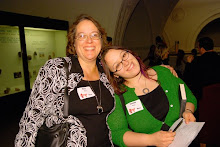I haven't written much about actually saying Kaddish in the past few months, partially because it has become so much a part of my routine that it already feels unremarkable, and partially because the few notable moments of saying Kaddish have been almost completely negative.
There are a few famous books about saying Kaddish, including of course Kaddish by Leon Wieseltier and Living a Year of Kaddish by Ari Goldman. But there are no books about saying Kaddish as a woman (that I know of), and I think this has a lot to do with the extremely different experience a woman has at almost any daily minyan.
Simply put, there are thousands of minyanim where a man can go to say Kaddish when he is mourning a parent, and there are websites designed to help one find the closest and most convenient service. In big cities it's not uncommon for a mincha minyan to meet in a conference room, a stairwell, or a large office. But the vast majority of these minyanim are Orthodox, which means that they require some form of physical separation between men and women during davening. This is called a mechitza, and most often appears in the form of a sheet, a curtain or a balcony. In many of these places, women simply wouldn't be allowed to join the minyan because it wouldn't be possibly to put up a mechitza.
Even at synagogues that have women's sections (sometimes called Ezrat Nashim) it is so uncommon to see women at minyan that men have appropriated the space for themselves. At one synagogue in Manhattan's midtown the women's section on the floor of the sanctuary has signs all over that say it is for women only, and that men should not sit there, but the signs are ignored by the dozens of men who show up for mincha and pace up and down the area. At that same synagogue, when the sanctuary was unavailable one day I was asked to stand behind a door. Once, a man stood on the staircase leading to the women's balcony, effectively blocking women from davening. Shuckeling with his eyes closed it was clear to me that he had no idea I was trying to get around him, or that his particular spot might be a tad inconvenient for others. At Chabad of Midtown I stood on the women's side of the mechitza, surrounded by men who seemed to either not notice or not understand that I was a woman, and they were not supposed to be hanging out with me while praying. At a mincha minyan in DC that meets in a conference room my sister stands outside the door in a vestibule. A friend who's saying Kaddish this year as well tells me that she often finds that men just on the other side of the mechitza from her will talk all the way through the kaddish, though she's clearly saying it inches from where they stand.
I don't want to be a big whiny-pot. And I know that this kind of thing only matters to a small minority of people, but I happen to be one of those people, and I'm tired of being shoved behind a door and tired of standing awkwardly on the staircase.
The only way I can see to make this situation improve is for women to show up at shuls and minyanim more often. There are a combination of factors that have led to women often staying away, including child-rearing, and being told that women are not obligated to pray, but this has to stop. If women in the Orthodox community want to be taken seriously and treated like full members of the community, and not just vestibules for incoming Jews then we need to be present more often.
The year my mother was saying Kaddish I was only 14 but I remember her telling me how frustrated she was when she went to minyan. The shul she went to most often was "traditional," a denomination that seems to only exist in Chicago and England, wherein the service is Orthodox and only men are counted in the minyan, but seating is mixed. One day there were nine men and three women present. The men called a local Jewish janitor, who sat listlessly in his chair while the rest of the men davened.
I didn't really understand at the time, but now I get it. There is something incredibly frustrating and sad about trying to fulfill a mitzvah that honors a dead parent and feeling like you're being discouraged or dishonored in the process. It feels like an insult directed at both the parent and the child saying Kaddish.
I don't mind that I'm not counted towards the minyan when I go to an Orthodox shul, but I do mind that many of these places seem mystified by the concept of women even showing up for services. Women need to start making their presence known more at synagogues, and synagogues, in turn, need to make sure they have acceptable spaces and facilities for women.
Photo: My mother and a girl she taught to read Torah about 15 years ago.




2 comments:
I totally agree. As Rabbi of an orthodox shul I have recently become vocal about leaving the women's section available for the occasional woman who comes on a weekday. What is more interesting to me though is what is the draw for men in that section? Perhaps the anonymity, or for latecomers the hidden nature of that space? Maybe there is even an intimacy offered by a mechitza? Any thoughts?
As a liberal Reform Jew, I was saddened and angry to read about your reception in Orthodox congregations where you've gone to say kaddish. I admire your persistence and wish you well as you continue to fulfill this mitzvah.
Post a Comment